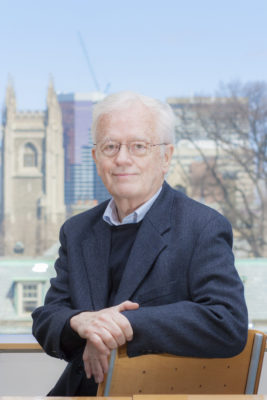 Professor Emeritus of Political Science; Dr. David Chu Professor Emeritus of Asia Pacific Studies, University of Toronto
Professor Emeritus of Political Science; Dr. David Chu Professor Emeritus of Asia Pacific Studies, University of Toronto
The activities of the Japan Foundation are so crucial in helping people, of all walks of life, to think about the complexities of the world. Human beings must cooperate and make decisions together. The complexities and interconnections of the world requires that Japanese and Canadians know each other.
Professor Donnelly was a Visiting Professor at Japan Woman’s University for a year, from 1995-1996. But his connection with Japan goes back far longer.
I arrived in Japan in 1958 on a propeller plane. It was a time before satellites, jet planes, moon landings, digital libraries, virtual classrooms, machine intelligence…. the internet. It was the Japan of OZU and KUROSAWA. I have watched and experienced at close hand what has happened in Japan before and since my one-year research tenure. I already had many memories. More were to come. The nature of change and continuity in any country is a Grand Mystery across most academic fields, including Japan Studies. My midpoint was 1995-96. The Economic Miracle was over. The national future seemed uncertain. I have followed the national story to this day.
I rediscovered how many people, scholars and others are willing to share their time, their quiet and sometimes passionate views…
In 1995-96 I’d begun a new research project on the development of nuclear power in Japan. I also completed a collaborative project on Cultural Aspects of Trade Dispute Resolution in Japan and China and another on US-Japan trade relations. During my stay I made research trips to many prefectures where nuclear power facilities are located. I rediscovered how many people, scholars and others are willing to share their time, their quiet and sometimes passionate views, their thoughts about my research findings and tentative conclusions.
Institutional support in Tokyo was crucial. I gave a few talks while in Japan. I visited specialized libraries to consult and read Japanese language materials unavailable in North America. A trip to Japan in those days meant hunting and gathering research materials for shipment home. I was a keen collector.
Professor Donnelly has been studying, researching, and teaching Japan since 1965. He is recognized and celebrated in academic and diplomatic circles for his contributions to Japanese Studies and Japan-Canada relations. In 2014, he was awarded the Order of the Rising Sun, Gold Rays with Neck Ribbon, by the Japanese government.
Japan has meant life-long study, learning and relearning, and constant reflection.
Upon returning [from the fellowship] I completed my tenure as Associate Dean of the Faculty of Arts and Science, subsequently served as the Founding Director of the Asian Institute, and also first holder of the Dr. David Chu Professorship of Asia Pacific Studies. Japan was always a central concern in my teaching, research and administrative service. On many occasions I collaborated with Programs and Initiatives of the Toronto Office of the Japan Foundation. The library and staff are an enormously important source of knowledge and information for students, academics, researchers and the general community in Toronto and beyond. The array of programs about Japan is extraordinary. It is a uniquely collaborative way to understand Japan beyond the surface.
Japan has meant life-long study, learning and relearning, and constant reflection. I established numerous contacts with Japanese academics. I taught for nearly 40 years on Japan, in all sorts of ways, at all sorts of levels, with all sorts of content in mind. I have written on a variety of subjects, including some collaborations. I made some modest contributions to institution building on Japan and Asia at the University of Toronto and more generally on Japan-Canada educational ties. I also participated in various community outreach activities.
The activities of the Japan Foundation are so crucial in helping people, of all walks of life, to think about the complexities of the world. Human beings must cooperate and make decisions together. The complexities and interconnections of the world requires that Japanese and Canadians know each other. The Japan Foundation in all its programs is uniquely a part of what should be done. The Canadian Government needs to emulate Japan.

